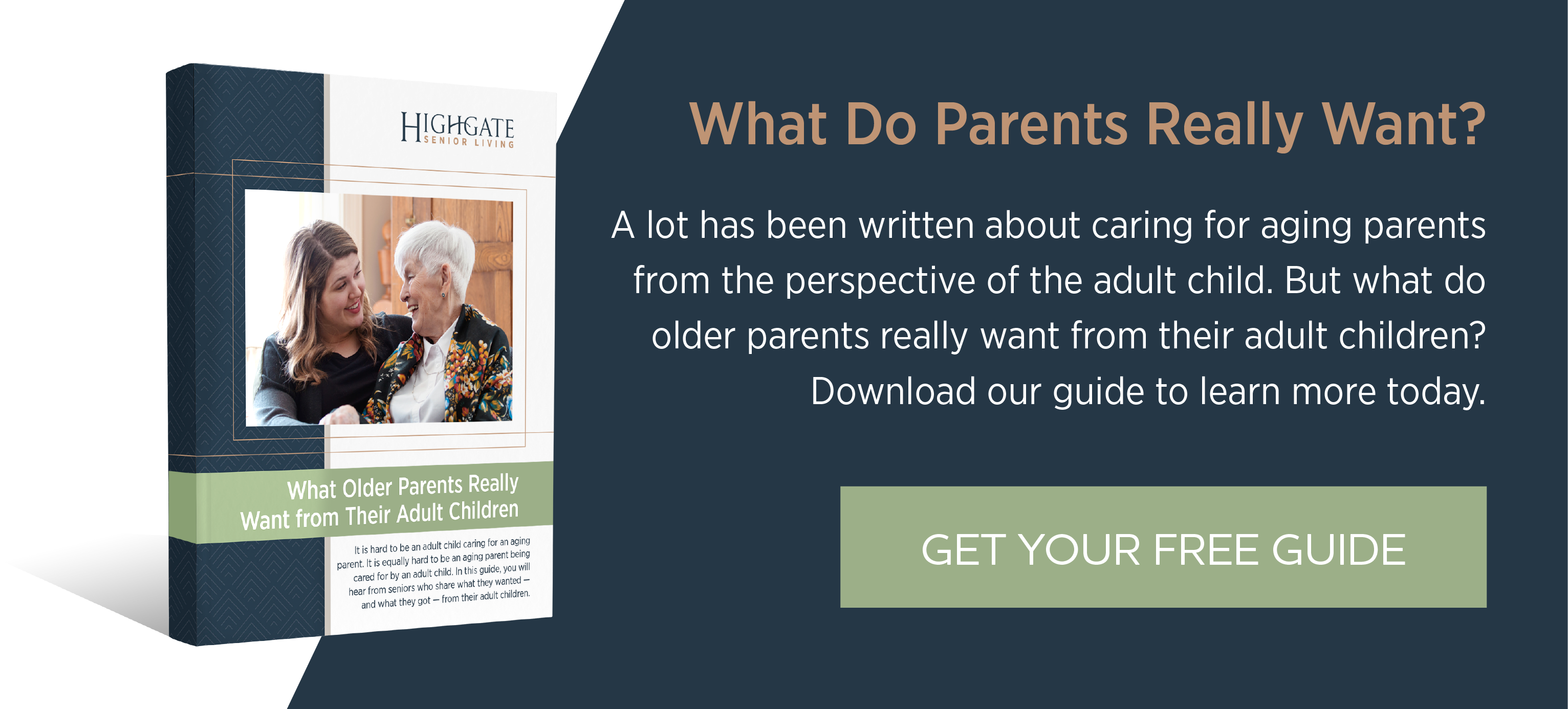
Be happy and healthy at an old age - that’s the goal. But, when a health crisis risks this, it’s not abnormal for an adult child to come running to the rescue - or so they think. Helping a parent live their best life after suffering a heart attack, a stroke, a type two diabetes diagnosis, or some other life changing diagnosis is sometimes easier said than done.
While you might have the best of intentions, how you respond to a change in health condition with an aging parent can make a world of difference in whether your parent feels empowered or like they’re losing control of their own life. “There’s a fine line between caring and controlling,” says Amelia Adkins, Senior Director of Marketing for Highgate Senior Living. “Instead of automatically providing as much assistance as you can when your parent starts needing help with everyday activities — even if you’re doing it because you want them to be safe or you feel like it’s your duty — it’s important to empower your parent to find meaning, purpose, and potential - despite the life changes they have experienced.”
So what can you do to help your parent live their best life in old age?
1. Encourage Them to Embrace Change & Find Purpose
There’s a reason why the time between the ages of 65 and 80+ is considered to be your “golden years.” Typically, older adults have fewer career and family responsibilities, and when coupled with retirement savings and good health, the golden years offer rich possibilities for self-fulfillment and purposeful engagement.
But not all seniors describe this period of adulthood as golden. A common trap older adults fall into is believing that they’ve already experienced the prime of their lives and that the time after retirement is just one long, steady decline.
If you’ve noticed changes in your parent’s mood, that they don’t participate in activities they once did, or they lack the motivation to get out of bed in the morning, encourage your parent to focus on what they want out of this next chapter of life.
“Staying active and engaged is so important,” says Katrina Custodio, the Life Enhancement Coordinator at Highgate at Temecula. “It’s about the quality of life. When someone has a purpose, it gives them a sense of self-worth.”
Research shows that people who have a greater sense of purpose in life are more likely to have slower rates of mental decline, decreased mortality, and increased happiness in old age. So maybe you help your parent brainstorm a “purposeful living project,” such as writing a memoir for posterity or volunteering.
2. Help Them Change Their Mindset Around Aging
Is your dad always telling you that he can’t do what his physical therapist asks him to try? Or maybe your mom always says she feels too weak and tired to go on a walk with the grandkids?
Another way you can help your parent live their best life is to remind them that aging is a mindset. “It comes down to attitude, not what you look like or what activities you can or cannot do,” Adkins says. “Help your parent see what they can accomplish because of aging, not in spite of aging.”
Try asking questions like, “What are some things you used to enjoy doing that you haven’t done in a while?” Maybe your parent can’t pursue the roles and passions of their younger years, but they can still tap into their past for inspiration, trying something new that is either an extension of what they did before or that takes them in a new direction.
For example, if your mom spent years caring for her grandchildren, she may discover now that she has time to sit down at a computer and write short stories about their adventures. Or maybe during Dr. Seuss week, she’d like to read a Dr. Seuss book to Kindergarteners at the local elementary school. Was your dad an athlete? Maybe he’d enjoy taking up tai chi, or joining a men’s group.
Of course, it can be more difficult to maintain a positive attitude if you have chronic problems, experience loneliness, or suffer from depression. So if physical or psychological problems are influencing the way your loved one feels about growing older, make sure you talk to their doctor.
3. Focus on What They Can Do, Not What They Can’t
One of the best ways you can help your parents live their best life in old age is to focus on what they can do, not what they can’t. Empowering them to do activities and tasks as independently as possible actually helps them retain their abilities and boosts self-esteem.
“I’m always under the thinking if you believe they can do it, they can achieve it,” says Rose Zamudio-Mora, Life Enhancement Specialist at Highgate at Vancouver. “You never underestimate anyone.”
For example, if cooking a specialty meal requires more than the normal steps, ask your mother to help you prep the vegetables or set the table, versus simply making the dinner for her.
Mandy Ketcham, Community Relations Coordinator at Highgate at Yakima, shares a story about what can happen if you jump in with help too quickly or assume your loved one is no longer capable: “We had one resident whose friend told us that because she was 95, all she wanted to do was sit there and people watch. She said that she used to play the piano and dance, but because she is at the age she is, she was unable to. Well, we took this as a challenge. Turns out, she was still able to play the piano with the proper cues and still loved to dance! Because no one took the time to properly encourage either of those passions, she had not done either in a long time. Yet she truly enjoyed doing these two things.”
To learn more about how you can help your parents live their best life in old age, download our eBook What Older Parents Really Want from Their Adult Children.






